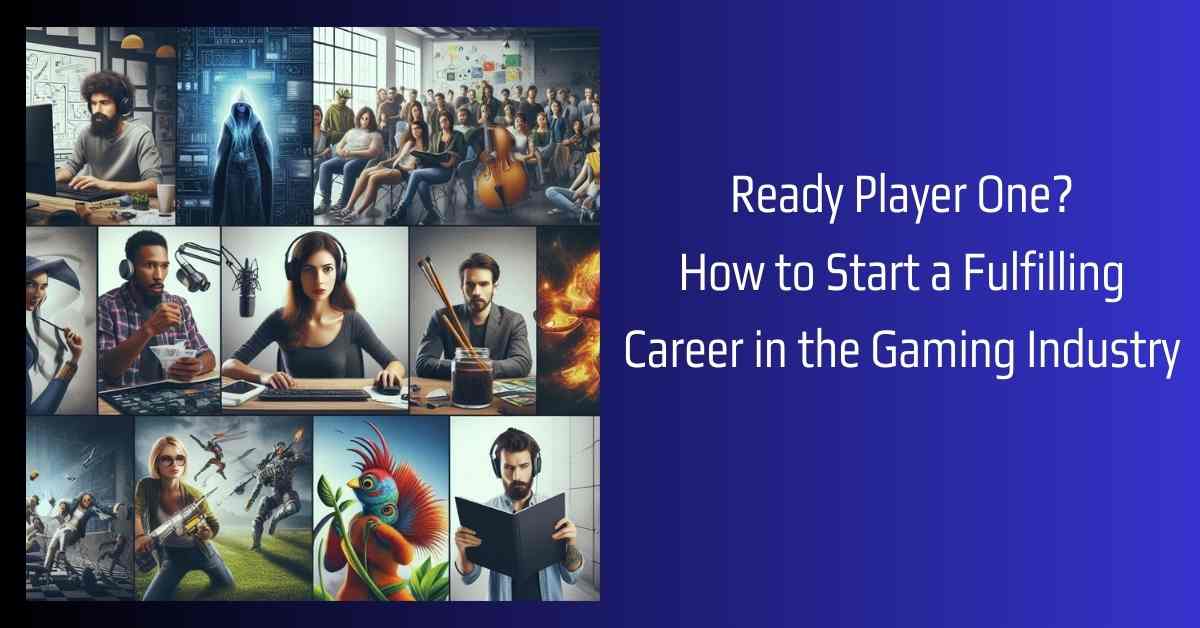Let's be brutally honest: most so-called "smart" home tech is dumber than a bag of…

Score Big: Fast-Track Your Career in Gaming Industry with Expert Strategies
🔥 LEVEL 0: The Grind Is Real. The Payoff? LEGENDARY. 💰
Listen up. Forget cuddly mascots and casual Friday streams. Gaming ain’t just ‘fun’ anymore. It’s a MULTI-BILLION DOLLAR JUGGERNAUT reshaping entertainment, tech, and how we connect. 🌍 We’re talking $221+ BILLION projected in 2024, and the graph only goes UP. 📈
This isn’t about hitting high scores. It’s about FORGING a future in a sector that’s minting tech wizards, marketing overlords, data sorcerers, and the architects of virtual worlds. AI, VR/AR, Esports Management – this is the NEW FRONTIER. 🛠️
YOUR CHEAT CODE –> This ain’t your grandma’s career guide. This is a RAPID-FIRE DOWNLOAD. No fluff. No handholding. Just raw intel, tactical blueprints, and the insider frequency to get YOU HIRED. 🧠
STAKES –> Ignore this? Get left behind. Become a digital ghost while others build empires. Understand this? You unlock the mainframe. 🔓
BUCKLE UP. Player mode OFF. Powerhouse mode ON. Let’s dissect the chaos and forge some clarity. 👇
- 🎯 PHASE 1: Lock Target – Find Your Combat Role ⚔️
- 🚀 PHASE 2: Trends On Fire – Where The Real Money Flows 💸
- 🛠️ PHASE 3: Forge Your Arsenal – Skills & Portfolio Dominance 💪
- 💡 PHASE 4: Resource Drop – Targeted Intel & Project Blueprints 🗺️
- 🌐 PHASE 5: Infiltrate The Network – Connectios Are Power 🔌
- 📡 PHASE 6: Target Lock – Finding Your Hubs (Events & Servers) 📍
- 💼 PHASE 7: Executing The Heist – The Gaming Industry Job Hunt 💰
- 🧠 PHASE 8: Stay Sharp Or Decay – Thriving Long-Term 📏
- 🛡️ FINAL PHASE: System Maintenance – Burnout Prevention Protocols 🧘♀️
- 🏁 CONCLUSION: The Next Level Is Yours To Claim 🏆
- FAQs
🎯 PHASE 1: Lock Target – Find Your Combat Role ⚔️
The gaming universe is vast. A chaotic sprawl of intersecting realities. Going in blind? YOU’RE PREY. Specialization isn’t optional; it’s SURVIVAL. Pick your weapon. Master it. Become INDISPENSABLE.
WHY SPECIALIZE? ZERO-BULLSH*T EDITION:
- HIGH-VALUE TARGET –> Niche skills = BIG demand. Studios, organizations, communities – they pay top dollar for laser focus. 💰
- REP > RANK –> Master your domain = become the go-to operative. Credibility skyrockets. Doors UNLOCK. 🔑
- SIGNAL vs. NOISE –> Generic hopefuls = STATIC. Specialized pro = CLEAR SIGNAL. Get noticed. Get hired. 📡
POTENTIAL BATTLEGROUNDS – CHOOSE WISELY:
🤖 GAME DEVELOPMENT: THE WORLD BUILDERS
- PROGRAMMING: Wield C++, C#, Java, Python. Bend Unity & Unreal Engine to your will. Code is the MATRIX. Mobile, cloud, cross-platform? ESSENTIAL SKILLS. 💻
- GAME DESIGN: Architect the ADDICTION. Levels, loops, narrative hooks, player psychology. KEEP THEM PLAYING. Level Designers build maps; Mechanics Designers build RULES. 📜
- ART: VISUAL ALCHEMY. Characters, environments, UI/UX that works, 2D/3D animation that moves. Make it ICONIC. AR/VR skills? HOT DEMAND. 🎨
- SOUND DESIGN & MUSIC: Craft the ATMOSPHERE. Evocative scores, bone-crunching FX, compelling VO. IMMERSE OR DIE. Sound Designers create; Audio Engineers perfect; Composers score the SOUL. 🎧
🏆 PROFESSIONAL ESPORTS: THE DIGITAL GLADIATORS
- COMPETE: Sheer skill. Brutal practice. ICE VEINS. Team synergy. Strategic genius. High-stakes pressure is the AIR YOU BREATHE. 🎮
🎬 CONTENT CREATION: THE INFLUENCE ENGINE
- STREAMING: LIVEWIRE PERSONALITY. Twitch/YouTube mastery. Charisma + Commentary + Community. ENGAGE OR FADE. 🎙️
- GUIDES & WALKTHROUGHS: Be the ORACLE. Deep dives, strat breakdowns, video tuts. Prove your MASTERY. 🗺️
- REVIEWS & ANALYSIS: Critical eye. Dissect design. Shape opinions. BE THE TASTEMAKER. Written or video – make it SHARP. 🧐
🐞 GAME TESTING (QA): THE GATEKEEPERS
- BREAK IT TO MAKE IT. Polish the product. RUTHLESS observation. METICULOUS bug reports. CONSTRUCTIVE feedback. You are the FINAL DEFENSE. 🛡️
💬 COMMUNITY MANAGEMENT: THE FAN WHISPERERS
- NERVE CENTER of the fandom. Engage. Resolve. Gather intel. Foster loyalty. BRIDGE THE GAP between players and devs. Report bugs and gauge sentiment. CRITICAL ROLE. 🫂
✍️ GAMES JOURNALISM & WRITING: THE STORYTELLERS
- REPORT: Breaking news, event coverage, interviews. GET THE SCOOP. 📰
- LORE MASTERS: Build worlds with words. Narrative design, wiki entries, tie-in content. WRITE THE MYTHOS. 📚
ACTION ITEM –> Experiment. Tinker. Mod. Write. Stream. Find the path that IGNITES your core processors. 🔥 Passion isn’t enough. You need OBSESSION.
🚀 PHASE 2: Trends On Fire – Where The Real Money Flows 💸
Forget the rockstar dev mythos for a second. The REAL seismic shifts are happening around the code. This is where fortunes are made, careers are forged. PAY ATTENTION:
📱 MOBILE GAMING: BILLIONS IN THEIR POCKETS
This ain’t kid stuff. It’s a global phenomenon. The gold rush isn’t just making the games…
- MARKETING MAVENS –> The PSYCHOLOGY of the click. Data-driven campaigns. Social media empires. Monetization is KING. Skills: Digital Marketing, Analytics, Social Strategy. 🧠
- ANALYST LEGIONS –> DECODE PLAYER BEHAVIOR. Optimize. Retain. Monetize. Game Analytics + Monetization Strategy = PROFIT ENGINE. 📊
- UI/UX ALCHEMISTS –> Tiny screens, BIG challenge. Intuitive design is NON-NEGOTIABLE. Skills: UI/UX Principles, Mobile-First Design. ✨
🥇 ESPORTS MANIA: BEYOND THE KEYBOARD WARRIORS
The players are just the tip of the iceberg. Building the ECOSYSTEM is where the BIG BUCKS are.
- EVENT ARCHITECTS –> SUPERBOWL-SCALE LOGISTICS. Project management ninjas are needed.
Skills: Organization, Planning, Execution. 📅 - HYPE GENERATORS –> FAN FRENZY ENGINEERS. Social media maestros turning matches into MUST-SEE TV.
Skills: Social Media Mgmt, Content Creation, Community Engagement.📢 - DEALMAKERS –> MILLION-DOLLAR NEGOTIATORS. Sponsorships, partnerships, and player contracts. Sports management with a digital edge.
Skills: Negotiation, Business Dev. 🤝 - META STRATEGISTS –> BROADCAST ANALYSTS. Breaking down plays for the masses. The John Madden of pixels.
Skills: Deep Game Knowledge, Communication. 📈
🕶️ BEYOND VR: AR – AUGMENTING REALITY (AND PAYCHECKS)
Forget clunky headsets (for now). AR is stealthily integrating. Opportunity knocks LOUDLY.
- SPATIAL DESIGNERS –> MERGE DIGITAL & PHYSICAL. Dev’s building experiences on top of reality.
Skills: AR/VR Dev (Unity/Unreal w/ ARKit/ARCore), 3D Modeling. 🌐 - LOCATION-BASED MARKETERS –> REAL-WORLD QUEST DESIGNERS. Promotions that blend pixels and pavement.
Skills: Creative Marketing, Location Tech Savvy. 📍 - MONETIZATION MECHANICS –> The next Pokémon GO needs a REVENUE ENGINE. How do you make augmented interactions pay?
Skills: Monetization Models, Game Analytics. 🤑
🤖 THE AI UPRISING: INTELLIGENCE IS THE NEW GOLD
AI isn’t sci-fi; it’s CORE TECH. Driving innovation, creating entirely new roles.
- AI ENGINEERS –> BREATHING LIFE INTO NPCs. Designing adaptive difficulty, procedural content, and smarter environments. THE FUTURE IS ALGORITHMIC. Skills: Comp Sci, Machine Learning, AI Frameworks (TensorFlow, PyTorch). 🧠💡
THE BIG PICTURE –> Coding is ONE piece. Marketing, analysis, management, design – the industry needs DIVERSE TALENT. Do you love games but hate coding? YOUR PATH EXISTS. Find it in the trends. 🔥
🛠️ PHASE 3: Forge Your Arsenal – Skills & Portfolio Dominance 💪
Niche locked. It’s time to LOAD OUT. Skills + Proof = GETTING NOTICED. Generic resumes get deleted. SHOW, DON’T TELL.
PATHWAYS TO POWER:
- FORMAL EDUCATION (Degrees/Bootcamps):
- PROS: Structured learning, credentials, networking potential, mentorship access. 🎓
- CONS: EXPENSIVE. Time-consuming. MAY LAG BEHIND cutting-edge needs. ⏳💸
- EXAMPLES: Uni degrees (Comp Sci/Game Dev focus), intensive coding/art boot camps, specialized online cert programs.
- SELF-LEARNING (The Digital Forge):
- PROS: AFFORDABLE/FREE. Flexible pace. Deep dives into YOUR niche. 🚀
- CONS: Requires IRON DISCIPLINE. Self-direction is key. Curating reliable sources is CRUCIAL. 🧠
- RESOURCES: Udemy, Coursera, Skillshare, YouTube deep dives, OFFICIAL ENGINE DOCS (Unity/Unreal = GOLD), forums, GitHub.
YOUR PORTFOLIO = YOUR PROOF OF LIFE 🧬
This ain’t a maybe. It’s your TREASURE CHEST. Your BATTLE RECORD. Concrete evidence you can DO THE WORK. Tailor it RUTHLESSLY to your target niche.
- WHY IT’S NON-NEGOTIABLE:
- DEMONSTRATES ABILITY –> Talk is cheap. Code/Art/Analysis speaks VOLUMES. 🗣️
- SHOWS INITIATIVE –> Proves you’re not just waiting for instructions. PASSION IN ACTION. 🔥
- CUTS THROUGH NOISE –> Makes you MEMORABLE in a sea of applicants. ✨
GET YOUR HANDS DIRTY – TACTICAL EXECUTION:
- BUILD SMALL, FINISH STRONG: Simple games/mods. Complexity increases with skill. Demonstrates core loops (Code), flow (Design), and style (Art). 👾
- CONTRIBUTE TO OPEN SOURCE: LEARN COLLABORATION. Real-world workflows. GitHub is your proving ground. 🤝
- GAME JAMS (THE CRUCIBLE): FORGE SKILLS UNDER PRESSURE. itch.io, Global Game Jam, Ludum Dare. RAPID PROTOTYPING MUSCLE. ⏱️💥
CRITICAL INTEL –> The “best” path is YOUR path. Blend ’em. Formal learning + Savage self-teaching + RELENTLESS PROJECT WORK = Maximum Impact. 💣
STAND BY FOR SPECIFICS… Overwhelmed? Don’t crash. Next transmission: Targeted resources & project blueprints to build that killer portfolio. Stay frosty. 🥶
💡 PHASE 4: Resource Drop – Targeted Intel & Project Blueprints 🗺️
Enough theory. Let’s get TACTICAL. Resources and project ideas tailored to the front lines. Apply these principles EVEN IF YOUR NICHE ISN’T LISTED. Focus: HANDS-ON. RELEVANT. DEMONSTRABLE.
1. GAME DEVELOPMENT (CODE, DESIGN, ART, SOUND):
- ONLINE COURSES (Intel Hubs):
- Udemy/Coursera: Search SPECIFICALLY (e.g., “Unreal Engine C++ Gameplay,” “Unity Mobile Optimization,” “Game Design Documentation,” “Blender Character Modeling”). 🎓
- GameDev.tv: Project-focused learning. Build COMPLETE games.
- Engine Docs: RTFM! (Read The Fine Manual). Unity & Unreal docs are ESSENTIAL. Free, comprehensive.
- Skillshare/Pluralsight: Quality content across the board.
- PROJECT IDEAS (Build Your Legend):
- Small, Polished Games: Nail a CORE MECHANIC. Show you can FINISH. ✨
- Mods: DISSECT & REBUILD. Shows understanding of existing systems. Popular mod = Instant credibility. 🛠️
- Classic Clones (Pong/Tetris): SOLIDIFY FUNDAMENTALS. Proof of core logic. 🧱
- Art Portfolio Sprints: Character sheets, environment concepts, prop modeling sets. SHOWCASE YOUR STYLE & SKILL. 🎨
- Sound Design Demos: Re-sound a game trailer. Create an SFX library for a specific genre. AUDIO EVIDENCE. 🔊
2. ESPORTS (PLAYER, ANALYST, CASTER):
- SKILL HONING (The Grind):
- VOD Review: Analyze top players FRAME BY FRAME. Steal starts and spot weaknesses. 🧐
- Targeted Practice: Isolate skills. Drill them. TRACK PROGRESS. 📈
- Team Synergy: Find a squad. COMMUNICATE OR DIE. Practice scrims religiously. 🤝
- PROJECT IDEAS (Show Your Smarts):
- Tournament Record: Compete. Show results (FACEIT, ESEA, local LANs). PROOF OF COMPETENCE. 🏆
- Strategy Deep Dives: Blog posts and video essays analyze meta, counters, and team comps. DEMONSTRATE KNOWLEDGE. 🧠
- Caster/Analyst Reel: Montage your best calls and sharpest insights. SELL YOUR VOICE/BRAIN. 🎙️
3. CONTENT CREATION (STREAMING, VIDEO):
- ONLINE COURSES (Sharpen Your Edge):
- Platform Resources: Twitch Creator Camp, YouTube Creator Academy. LEARN THE PLATFORM.
- Video Editing Mastery: Premiere Pro, DaVinci Resolve (free!), Final Cut. SLICK EDITING = PROFESSIONAL. 🎬
- Storytelling/Scripting: Even short clips need structure. Hook ’em fast. NARRATIVE IS POWER. ✍️
- PROJECT IDEAS (Build Your Brand):
- THE STREAM ITSELF: Consistent schedule, good AV quality, ENGAGEMENT. This IS your portfolio. 🔴 LIVE
- Highlight Reels: Viral potential. Easy sharing. BEST MOMENTS ONLY. ✨
- Tutorials/Reviews: PROVIDE VALUE. Shows expertise and helps viewers. 🙏
- Collabs: Network + Audience Growth. CROSS-POLLINATE. 🚀
4. OTHER NICHES (QA, COMMUNITY, JOURNALISM):
- GAME TESTING (QA): Document THOROUGHNESS. Create DETAILED bug reports (use templates). Offer ACTIONABLE feedback. Show your eagle eye. 🐞
- COMMUNITY MANAGEMENT: Moderate a Discord/Subreddit. SHOW GROWTH & POSITIVE ENGAGEMENT. Log results (dispute resolution, feedback collation). Prove you can build a space. 💬
- GAMES JOURNALISM/WRITING: Start a blog. Pitch articles. Create video essays. BUILD A CLIP PORTFOLIO. Medium, Substack, YouTube. Showcase your voice and analysis. 📰
FINDING THE REST – INTEL SOURCES:
- Game Jam Hubs: itch.io, Global Game Jam, Ludum Dare. FIND TEAMS & CHALLENGES.
- Open Source: GitHub. Search by language/engine/genre. CONTRIBUTE & LEARN.
- Job Boards (Reverse Engineer): Check listings (Game Developer, Hitmarker, studio sites). SEE WHAT SKILLS THEY DEMAND. Tailor learning. 🎯
- LinkedIn/Twitter: Follow studios/devs. SEE WHAT THEY TALK ABOUT.
NEXT PHASE –> You’ve got the tools. Now, let’s INFILTRATE THE NETWORK. Connections are currency. 🌐
🌐 PHASE 5: Infiltrate The Network – Connectios Are Power 🔌
Skills? Check. Portfolio? Check. Now, the HUMAN ELEMENT. In this industry, WHO YOU KNOW opens doors faster than a master keycard. Stop coding in a vacuum. GET CONNECTED.
FORGE ALLIANCES – YOUR PATHWAYS TO OPPORTUNITY:
🤝 INDUSTRY EVENTS: THE NEXUS POINTS
- MAJOR CONS (The Big Leagues):
- GDC (Game Developers Conference): https://gdconf.com/ –> DEV CENTRAL. Professionals only. High-value networking.
- PAX (East/West/Aus/Unplugged): https://www.paxsite.com/ –> Public focus, STRONG industry presence. Devs, publishers, community.
- Gamescom: https://www.gamescom.global/ –> EUROPE’S GIANT. A mix of public hype and industry deals.
- E3: https://e3expo.com/ –> HISTORICALLY HUGE for reveals. Currently ON HIATUS/DEFUNCT. Monitor for potential future revival, but don’t bank on it. [Current Status Uncertain] 🚫
- NICHE GATHERINGS (Targeted Strikes): Esports tourneys, indie showcases (IndieCade, The MIX), engine-specific dev days (Unite, Unreal Fest). FIND YOUR TRIBE.
- LOCAL MEETUPS (Guerilla Networking): Search Meetup.com, Facebook Groups (“Game Dev [Your City]”). BUILD REGIONAL ALLIES. Find collaborators. Stay informed.
💻 ONLINE COMMUNITIES: THE DIGITAL BACK-ALLEYS (24/7 Intel)
- DISCORD SERVERS: Game-specific hubs, engine communities (Unreal Slackers, Unity Discord), and career-focused servers. LISTEN. ENGAGE. CONTRIBUTE.
- SUBREDDITS: r/gamedev, r/playmygame, r/INAT (I Need A Team), engine/genre/niche specific subs. READ THE ROOM before posting.
- SOCIAL MEDIA (The Pulse): LinkedIn = ESSENTIAL for a professional presence. Twitter = Real-time dev chat, job postings (#gamedevjobs). Follow studios, leads, influencers. ENGAGE MEANINGFULLY.
⭐ SEEK MENTORSHIP: FIND YOUR GUIDING AI
- THE VALUE PROP: Experienced pros offer INSIGHTS, SHORTCUTS, and INTRODUCTIONS. Invaluable acceleration. 🚀
- HOW TO FIND: Existing network (profs, senior peers), LinkedIn search, community leaders, formal programs (less common, but existing). BE RESPECTFUL OF THEIR TIME. Offer value first.
🔗 THE POWER OF COLLABORATION: LEVEL UP TOGETHER
- SKILL EXPANSION: Fill YOUR gaps by working with others. Learn new pipelines, tools, and perspectives. Use Git/Version Control ALWAYS. <– NON-NEGOTIABLE for team play.
- PORTFOLIO AMPLIFICATION: Team projects look IMPRESSIVE. Show you can handle LARGER SCOPE. ✨
- PROVE TEAMWORK: Studios NEED collaborators. Show you can INTEGRATE & EXECUTE within a team structure. ✅
CRITICAL PROTOCOL –> Networking isn’t slimy sales. It’s BUILDING GENUINE CONNECTIONS. Be curious. Offer help. Share your passion. BE REAL. Authenticity resonates.
ACTION STATIONS –> Let’s pinpoint your connection hubs. Standby for tactical search parameters…
📡 PHASE 6: Target Lock – Finding Your Hubs (Events & Servers) 📍
Time to zero in. Generic searching = wasted cycles. TARGETED RECONNAISSANCE.
1. DECRYPTING INDUSTRY EVENTS:
- THE BIG GUNS (Recap & Context):
- GDC: https://gdconf.com/ –> PRO DEV FOCUS. Networking gold if you’re serious about a core dev role.
- PAX: https://www.paxsite.com/ –> PUBLIC + INDUSTRY. It is good for broader connections and seeing player reactions.
- Gamescom: https://www.gamescom.global/ –> EUROPEAN POWERHOUSE. Global reach, major announcements.
- E3 Watch: https://e3expo.com/ –> MONITOR STATUS. Was the king, now MIA. [Future Uncertain] 🚫
- NICHE EVENT HUNTING:
- SEARCH ALGORITHMS:
- Eventbrite/Meetup: Filter by “Gaming,” “Game Development,” “[Your Niche],” “[Your City].” 🔍
- Convention Center Calendars: Check major city venues directly. Sometimes, smaller expos hide there.
- Industry News Sites: Game Developer, GamesIndustry.biz often lists upcoming events.
2. INFILTRATING DISCORD SERVERS:
- DISCOVERY DATABASES:
- Disboard: https://disboard.org/ –> Searchable public server index. Primary tool.
- Top.gg / Discord.me: Alternative search platforms.
- TAILORING YOUR SEARCH (Keywords are MANDATORY):
- “Game Development,” “Indie Dev,” “Game Art,” “Level Design,” “Esports Coaching,” “Twitch Streamer,” “[Specific Game/Engine/Software].” BE SPECIFIC.
- Look for official game/engine servers, which often have dedicated career/dev channels.
- SIZE & SCOPE:
- Large Hubs: Good for general industry pulse and broad networking.
- Niche Servers: BETTER for deep expertise and finding collaborators in YOUR field. Join BOTH.
ADDITIONAL INTEL:
- Social Media Recon: Follow target studios/devs/org. They WILL promote events they attend/host. #GameDev #EsportsJobs etc.
- News Site Monitoring: https://www.gamedeveloper.com/, https://www.gamesindustry.biz/ – Check news roundups for event announcements.
EXAMPLE SEARCH STRINGS (Use as Templates):
- “Unreal Engine Discord”
- “Indie Game Developer Meetup London”
- “Esports Marketing Jobs Discord”
- “Fighting Game Community Events California”
- “Twitch Streamer Support Server”
EXECUTE SEARCH. Find your digital and physical rally points. Next: THE JOB HEIST. 💼
💼 PHASE 7: Executing The Heist – The Gaming Industry Job Hunt 💰
Skills honed. Portfolio gleaming. Network primed. Time to EXTRACT THE OFFER. Landing the job requires strategy, persistence, and ZERO ROOM FOR ERROR.
REALITY CHECK – SET EXPECTATIONS:
- ENTRY-LEVEL IS PROBABLE: Degree or not, expect Junior roles first. This is your BOOT CAMP. Gain XP, prove value. 📈
- COMPENSATION VARIES WILDLY: Role, studio size, and location = MASSIVE pay differences. RESEARCH SALARIES (Glassdoor, Levels.fyi) BEFORE negotiating. Don’t get lowballed. 💸
- THE PATH ISN’T LINEAR: A “side quest” role might unlock the main objective later. BE ADAPTIVE. Experience is experience. 🗺️
WHERE TO FIND THE LOOT (Job Opportunities):
- DIRECT ASSAULT (Company Websites): ALWAYS check the “Careers” or “Jobs” section of studios you admire (big AAA or small indie). Direct applications matter. 🎯
- INDUSTRY JOB BOARDS (Marketplaces):
- Game Developer Jobs: https://www.gamedeveloper.com/ (formerly Gamasutra) –> THE CLASSIC. Wide range.
- Hitmarker: https://hitmarker.net –> STRONG in Esports, growing elsewhere. It often lists smaller/indie roles.
- GameDev.net Jobs: https://gamedev.net/jobs/ –> Focused dev community board.
- ArtStation Jobs: https://www.artstation.com –> ART-CENTRIC.
- WorkWithIndies: https://www.workwithindies.com –> INDIE FOCUSED.
- Niche Boards: Search for boards specific to Esports (e.g., specific leagues) and content creation platforms.
- RECRUITMENT AGENCIES (Special Ops): Specialized gaming recruiters (e.g., Amiqus) have access to HIDDEN LISTINGS. They can be valuable allies. 🕵️♀️
- SOCIAL MEDIA INTEL (Listening Posts):
- LinkedIn: NON-NEGOTIABLE. Optimize profile HARD (Keywords!). Network actively. Connect with recruiters.
- Twitter: Studios/devs OFTEN post jobs directly. Follow relevant accounts. Use #gamedevjobs, #esportsjobs etc.
RESUME & COVER LETTER – YOUR INFILTRATION TOOLS:
- TAILOR OR DIE: NEVER send a generic resume. ADAPT IT for EACH. SINGLE. JOB. Mirror keywords from the description. Highlight RELEVANT skills/projects. 🔥
- PASSION ISN’T ENOUGH, BUT IT HELPS: Your cover letter connects the dots. Explain the “WHY” behind your portfolio projects. Show GENUINE ENTHUSIASM for that specific studio/role. ✨
- PROOFREAD LIKE YOUR CAREER DEPENDS ON IT. (Because it does). Typos = Instant Rejection. 🔍
PORTFOLIO – THE CROWN JEWELS:
- CURATE RUTHLESSLY: BEST. WORK. ONLY. Polished, relevant, visually appealing. Show VARIETY if applicable (but quality > quantity). 💎
- CONTEXT IS KING: BRIEFLY explain each piece: Your role? Challenges faced? Solutions implemented? Tools used? TELL THE STORY. 📜
- ACCESSIBILITY = CRITICAL: EASY TO NAVIGATE. Well-organized website (GitHub Pages, Carrd, Squarespace) or clean PDF/Drive folder. NO FRICTION for the reviewer. Use dedicated platforms: ArtStation (Art), Behance (Design), GitHub (Code).
FINAL PROTOCOL –> Leverage your network! Let contacts know you’re hunting. REFERRALS ARE GOLD. A warm intro beats a cold application EVERY TIME. 🤝
STANDBY… Job landed? The game isn’t over. It’s just beginning. Next: STAYING SHARP. 🔥
🧠 PHASE 8: Stay Sharp Or Decay – Thriving Long-Term 📏
Landing the job is checkpoint one. STAGNATION = EXTINCTION in this rapidly evolving ecosystem. Stay curious. Stay adaptable. PROTECT YOUR SYSTEMS.
CONTINUOUS LEARNING – THE EVOLUTIONARY IMPERATIVE:
- EMBRACE THE NEW: AR/VR, AI in workflows, Web3/Blockchain (watch closely!), Cloud Gaming – UNDERSTAND how trends impact YOUR niche. Experiment. Tinker. 🚀
- UPSKILL RELENTLESSLY: Dedicate time to EXPAND YOUR TOOLKIT. Online courses, new software, adjacent disciplines (e.g., coder learning design basics). ADD LAYERS to your expertise. 📚
- TREND ANALYSIS: Follow industry news (reliable sources!). Play new games (critically!). Analyze player behavior shifts. ANTICIPATE THE NEXT WAVE. 🌊
ADAPTABILITY – YOUR SURVIVAL MECHANISM:
- PIVOT POTENTIAL: Your dream job today might morph or vanish tomorrow. Be OPEN to shifting specialties within your domain. FLEXIBILITY IS STRENGTH. 💪
- TRANSFERABLE SKILLS = UNIVERSAL KEY: Problem-solving, communication, teamwork, project management. These are valuable EVERYWHERE. Hone them alongside tech skills. 🗣️
- FAILURE IS DATA: Not every project ships. Not every idea works. EXTRACT LESSONS. Iterate. Improve. FAIL FORWARD. <–>
SYSTEM STABILITY – AVOID CORE MELTDOWN (Burnout):
- CRUNCH IS A TRAP: The industry can be demanding. RECOGNIZE BURNOUT SIGNS (irritability, exhaustion, cynicism, detachment). Implement HARD BOUNDARIES. 🛡️
- WORK-LIFE INTEGRATION (Not just Balance): Schedule OFF-GRID TIME. Hobbies, exercise, social connections OUTSIDE gaming. Designated work hours. REGULAR BREAKS (Pomodoro Technique works). 🧘♂️🌳
- MENTAL HEALTH SUPPORT:NOT A WEAKNESS. Use available resources. Therapy, support groups, and industry org. PRIORITIZE YOUR PROCESSOR. ❤️🩹
- Take This: https://www.takethis.org –> GAMING SPECIFIC mental health resources & advocacy. VITAL.
STAYING AHEAD – INTEL FEEDS:
- News Hubs: Gamedev.net(https://gamedev.net), GamesIndustry.biz (https://www.gamesindustry.biz), Game Developer (https://www.gamedeveloper.com). DAILY READS.
- Tech Deep Dives: Follow specialized newsletters/blogs for AI, VR/AR, and Engine updates.
- Thought Leaders: Identify key voices in YOUR niche on Twitter/LinkedIn. See what they’re sharing/discussing.
- GDC Vault: https://gdcvault.com –> Access PAST TALKS. It’s a goldmine of insights, even if you can’t attend. 💾
MAINTENANCE PROTOCOL: Burnout isn’t a badge of honor; it’s a SYSTEM FAILURE. Prioritize sustainability for a LONG, FRUITFUL CAREER. Let’s get specific on prevention…
🛡️ FINAL PHASE: System Maintenance – Burnout Prevention Protocols 🧘♀️
Listen closely. Burnout is the silent killer of passion and careers in this industry. It’s not about “toughing it out.” It’s about SMART SUSTAINABILITY. Build these habits into your core OS.
HEALTHY WORK HABITS – YOUR DEFENSE GRID:
- REALISTIC TASK MANAGEMENT: Break down monolith projects. SMALL, ACHIEVABLE CHUNKS. Avoid the overwhelm matrix. ✅
- SCHEDULED OFFLINE CYCLES: REGULAR BREAKS ARE NON-NEGOTIABLE. Step away. Pomodoro (25min work / 5min break). Longer breaks every few cycles. Prevents mental fragmentation. ⏱️
- HARD BOUNDARIES: Define work hours. STICK TO THEM. Especially if remote. Disable notifications. Create physical/mental separation. PROTECT YOUR DOWNTIME. 🚪
- ACKNOWLEDGE PROGRESS: Log small wins. Celebrate milestones. COMBAT THE NEVER-ENDING TREADMILL feeling. Motivation boost. 🎉
- THE POWER OF “NO”: Overcommitted = Burnout fuel. Learn to POLITELY DECLINE when your bandwidth is maxed. Protect your core tasks. 🚫
BURNOUT PREVENTION RESOURCES – YOUR SUPPORT SQUAD:
- Take This: https://www.takethis.org/ –> ESSENTIAL. Gaming-focused mental health nonprofit. Articles, resources, support streams, AFK Rooms at cons. Use them. ❤️🩹
- Healthy Gamer: https://www.healthygamer.gg/ –> Coaching, community forums, content at the intersection of gaming & mental well-being. Comprehensive platform. 🧠
- Game Quitters: https://gamequitters.com/ –> For those whose relationship with gaming itself becomes unhealthy. Support groups and tools for balance/recovery. <–>
ADDITIONAL TACTICS:
- FIND YOUR SUPPORT NETWORK: Colleagues, friends, online communities. TALK ABOUT STRESS. Shared experiences reduce isolation. 🫂
- PHYSICAL SYSTEM INTEGRITY: Exercise. Nutrition. SLEEP. These are FUNDAMENTAL to mental resilience. Don’t neglect the hardware. 💪😴
- PROFESSIONAL SUPPORT: Therapy is a tool, not a stigma. Many companies offer Employee Assistance Programs (EAPs). USE THEM IF NEEDED. 🗣️
CRITICAL WARNING –> Early detection is key. IRRITABILITY? FOCUS ISSUES? CYNICISM? SLEEP/APPETITE CHANGES? These are system alerts. DO NOT IGNORE. Address them proactively. ⚠
🏁 CONCLUSION: The Next Level Is Yours To Claim 🏆
We’ve downloaded the core schematics: the paths, the tools, the dangers, the strategies. From finding your niche to landing the job and sustaining the grind – the blueprint is yours.
The gaming industry isn’t waiting. It’s EXPLODING. It needs talent. It needs YOU. Dedication, strategy, continuous learning – these are the keys.
MISSION CRITICAL TAKEAWAYS – BURN THESE INTO YOUR MEMORY:
- SPEC OPS > GRUNT –> Find Your Niche. MASTER IT.
- ARSENAL READY –> Build Skills & A KILLER Portfolio.
- ALLIES ACQUIRED –> Network. Connect. COLLABORATE.
- TARGET LOCKED –> Execute a SMART, Proactive Job Hunt.
- EVOLVE OR DIE –> Never Stop Learning. ADAPT.
- SYSTEM STABLE –> Prioritize Well-being. PREVENT BURNOUT.
INITIATE ACTION SEQUENCE:
- NICHE UNDEFINED? –> EXPLORE. Play. Tinker. Mod. Write. Find the spark. 🔥
- SKILLS IN PROGRESS? –> BUILD. Start that project. Find that mentor. Join that jam. 🛠️
- JOB HUNT ACTIVE? –> DEPLOY. Polish the assets. Activate network. Launch applications. 🚀
The controller is in your hands. The keyboard awaits your command. The future of gaming is being built NOW.
GO BUILD IT.
Check [Roadmap for Gaming as a Career] for further strategic plotting.
FAQs
Can you ACTUALLY make bank playing video games? 💰
AFFIRMATIVE. This ain’t Monopoly money. Multiple vectors exist:
PRO PLAY –> Prize pools, salaries, sponsorships. HIGH SKILL, HIGH STAKES. 🏆
CONTENT CREATION –> Ad revenue, subs, donations, BRAND DEALS, merch. BUILD YOUR EMPIRE. 🎬
INDUSTRY JOBS –> Dev, marketing, QA, community – the ECOSYSTEM needs operators. 🛠️ BOTTOM LINE: Yes. If you’ve got the skill, the grind, or the strategy. It’s a real economy.
What SKILLS are non-negotiable for a gaming career? 🧠
Beyond just reflexes? You need:
IRON DEDICATION –> This ain’t casual hours. THE GRIND IS REAL. 🔥
COMMAND PRESENCE –> Communication skills. Network, team talk, audience engagement. BE HEARD. 🗣️
ADAPTABILITY –> Metas shift. Platforms change. PIVOT OR PERISH. 🔄
TECH LITERACY –> Understand the tools, platforms, and software relevant to YOUR path. 💻
BRANDING SAVVY –> Especially for creators/pros. KNOW HOW TO SELL YOURSELF. ✨
ROLE-SPECIFIC ARSENAL –> Video editing (CUT THROUGH NOISE), graphic design (VISUAL ID), community mgmt (BUILD THE TRIBE). Know your tools.
Do I NEED a college degree? Paper chase or pixel power? 📜
A: MYTH BUSTED: For many paths? NEGATIVE.
PROS / CREATORS –> SKILL + PORTFOLIO + AUDIENCE = YOUR CREDENTIALS. Proven ability trumps paper MOST times. 💪
DEV / HIGH-END ART –> Degrees can help structure learning (Comp Sci, Digital Art) and provide networks. BUT NOT THE ONLY PATH. Self-taught legends exist. Bootcamps are viable alternatives. 🚀 CORE TRUTH: Demonstrable skill & results often speak louder than a diploma in THIS arena.
How do I find my NICHE in this chaos? Target acquired? 🎯
SYSTEMATIC EXPLORATION:
EXPERIMENT RELENTLESSLY –> Different genres, platforms (PC/console/mobile), and content styles (streams, guides, analysis, comedy). TEST EVERYTHING. 🧪
ANALYZE YOUR DATA –> What genuinely IGNITES YOUR CORE PROCESSORS? What holds your focus for hours? 🔥
ASSESS YOUR TALENT STACK –> Where do your NATURAL ALGORITHMS excel? Strategy? Reflexes? Communication? Creativity? 🤔
FIND THE INTERSECTION –> Passion + Skill + MARKET VIABILITY (Is there an audience/need?) = Your Niche.
Is it TOO LATE for me to jack into a gaming career? ⏳
HARD NEGATIVE. That’s scarcity mindset talking.
ESPORTS –> Yes, peak reflexes often skew younger. BUT NOT THE ONLY GAME. 🎮
CONTENT CREATION / STRATEGY / DEV –> ASSETS are Maturity, life experience, and unique perspectives. Wisdom > raw speed in many roles. 🧠
INDUSTRY GROWTH –> The field is EXPANDING. New roles and new platforms emerge constantly. BOTTOM LINE: The only “too late” is NEVER STARTING. Get in the game.
How do I actually BECOME a pro gamer? The GLORY path? ✨
ASCENSION PROTOCOL REQUIRES:
RELENTLESS GRIND –> Practice isn’t hours; it’s PERFECTED REPETITION. Identify weaknesses and ERADICATE THEM. ⚙️
COMPETITIVE FIRE –> Seek out challenges. DOMINATE ladders & tournaments (online/local). Get battle-tested. 🔥
NETWORK OR FIZZLE –> Connect with other high-level players, coaches, and team managers. BE VISIBLE. 🌐
DISSECT & ANALYZE –> VOD review. YOUR plays. PRO plays. Understand the META INSIDE AND OUT. 🧐
INFILTRATE TEAMS –> Scrims, tryouts. Team experience is CRUCIAL for most esports. 🤝
How do I launch a gaming YouTube / Twitch channel? Broadcast initiation? 📡
BASIC BROADCAST PROTOCOL:
CONTENT IS KING (BUT QUALITY IS THE CROWN) –> Find your angle. Be entertaining, informative, or unique. OFFER VALUE. 👑
RELIABLE SCHEDULE –> Consistency builds audience. SHOW UP. 📅
ENGAGE OR DIE –> Interact with chat. Build a community. ACKNOWLEDGE YOUR VIEWERS. ❤️
MINIMUM VIABLE GEAR –> Decent Mic = NON-NEGOTIABLE. A decent webcam helps. A stable internet is vital. 🎤📷
LEARN BASIC EDITING –> Clean cuts, maybe some simple graphics. POLISH MATTERS. 🎬
AMPLIFY YOUR SIGNAL –> Promote streams/videos on relevant social media. #Hashtag wisely. 📢
How do I handle the TOXIC SLUDGE online? Mental armor? 🛡️
REALITY: IT EXISTS. Defense Strategy:
BUILD MENTAL ARMOR –> Develop resilience. Don’t feed trolls. FOCUS ON THE POSITIVE. 💪
MOD TOOLS = FORCE FIELDS –> Learn and USE platform moderation (filters, bans, timeouts). Appoint trusted mods. ⚔️
CULTIVATE YOUR SHIELD WALL –> Nurture your positive community. They’ll often defend the space with you.🫂
KNOW WHEN TO DISENGAGE –> Sometimes, silence is the best weapon. Step away if needed. 🚶♂️
SEEK BACKUP –> If it gets overwhelming, talk to peers, friends, or mental health pros (See Burnout section). DON’T SUFFER ALONE. ❤️🩹
What gaming careers are actually IN DEMAND right now? Hot zones? 🔥
The battlefield is wide, but current hot zones include:
GAME DEVELOPMENT (ALL FLAVORS) –> Programmers (esp. Engine Specialists – Unreal/Unity), Artists (3D, Tech Art, VFX), Designers (Systems, Level, UX), Audio Engineers. ALWAYS NEEDED. 🛠️🎨
ESPORTS ELITE –> Top-tier players in established titles. Coaches, analysts, and team managers. 🏆
CONTENT COMMANDERS –> Engaging streamers, skilled video editors, and niche experts (guides/reviews). 🎬🎙️
QA GATEKEEPERS –> Meticulous testers are crucial for polish. 🐞
COMMUNITY ARCHITECTS –> Skilled managers who build and maintain fanbases. 💬
MARKETING & DATA STRATEGISTS –> Driving discovery, analyzing player behavior, monetization experts. 📈💰
How do I balance this GRIND with a healthy life? System integrity? ⚖️
CRITICAL. NON-NEGOTIABLE. OR YOU WILL CRASH.
SCHEDULED DOWNTIME –> Lock in regular breaks. STEP AWAY FROM THE SCREEN. Pomodoro helps. ⏱️
MOVE THE MEAT SUIT –> Exercise. Seriously. Boosts mental clarity & resilience. 🏃♂️
FUEL THE MACHINE –> Decent nutrition matters. Garbage in and garbage out applies to brains, too. 🍎
RECHARGE CYCLES –> Prioritize SLEEP. Essential for focus, mood, and learning. 😴
BOUNDARIES = FIREWALLS –> Define work/play time. Stick to it. Protect your personal life. AVOID BURNOUT AT ALL COSTS. 🔥➡️❄️ REMEMBER: A burnt-out machine is useless. Maintain your systems.



